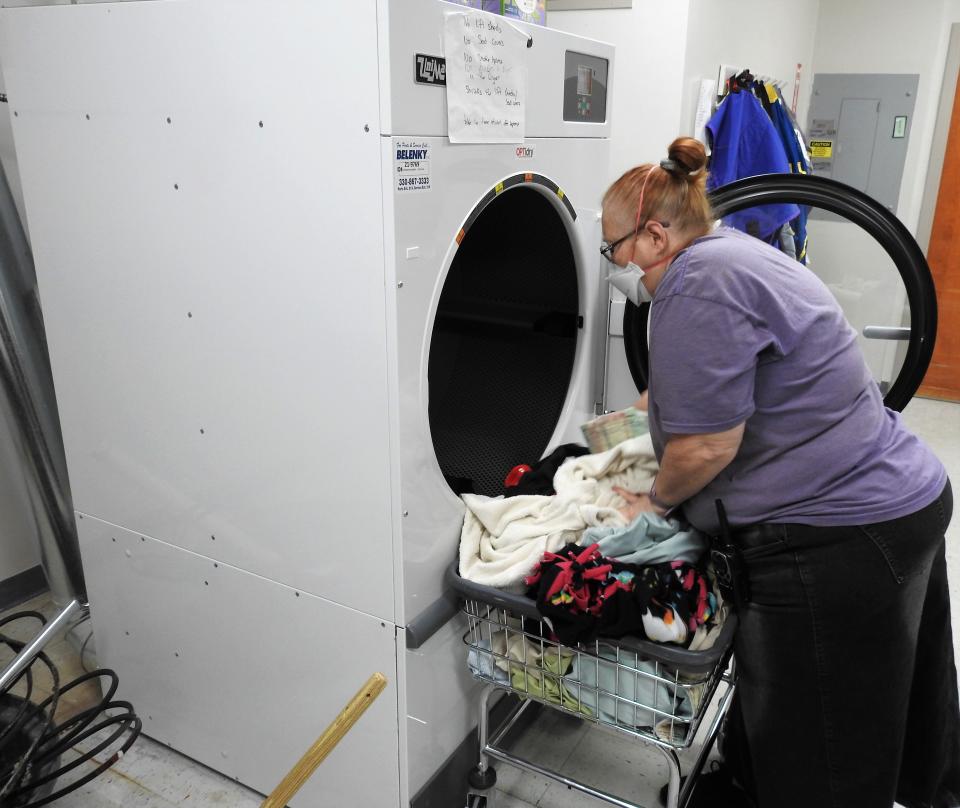Special needs facilities facing critical staffing issues
WARSAW − Carla Spencer of Dresden has worked as a direct support professional (DSP) at Echoing Hills Village in Warsaw for more than five years. It's the best place she's ever worked and she wishes more people would find the career.

"I love this job. These residents are my family. They won my heart from the first week I started and it's why I'm still here," she said.
However, Spencer is a rarity with her longevity. About 30% of employees have been at Echoing Hills six months or less. This is because the work is hard and pay is less than one can make elsewhere, but the need is great. There are close to 96,000 DD individuals in Ohio requiring services provided by DSPs.
DSPs are skilled professionals that provide a variety of support, ranging from cooking and cleaning to helping individuals with recreation and crafts to developing job skills and connecting with the community.
Those in management at such facilities said there's a detrimental void in the vocation currently. The state is being looked at to provide more money for pay raises, as most residents have Medicaid. It's hoped this will attract more people to a vocation where special connections with those cared for can be made.
"While our field is not the only industry facing a staffing crisis, it is one place where the action of the Governor ofOhio can make a substantial difference," said Echoing Hills President Timothy Neville in an open letter. "While missions may vary, all developmental disabilities service providers face the same challenges. Today, our field cannot hire enough staff to care for the individuals it serves. To say we have reached a staffing crisis is a gross misrepresentation of the current situation."

Echoing Hills
Echoing Hills was founded 56 years ago by the Rev. D. Cordell Brown and has locations across Ohio offering residential services and more to the developmentally disabled. The site in Warsaw also has a summer camp.
The residential facility has about 20 DSPs, but only eight are full time. The rest work only a few days a month. Program Director Jackie Householder said having about 20 full-time DSPs would be ideal, as the facility 25 residents. There's also a day program for residents focused on job and educational skills.
"This is a 24/7, 365 (days a year) job. You don't get holidays off. If you're working first shift and someone calls off on second shift, it's not like McDonald's where we can work with one less person and survive," Householder said.
Angie Jordan, director of community relations and development, said Echoing Hills has more than 365 DSPs statewide. She said they need around 400. DSPs make up the bulk of their employee base.
"The workforce crisis has been something real to us. We continue to see wages in every industry increase. This is hard work, this is a hard job. You have to figure, if you can go to a fast food place and make as much money or more money, that might be appealing to you," Jordan said. "The increasing wages are crazy and it's hard for us to compete with that."
Jordan said the majority of residents have Medicaid. Others have different insurances or are private pay. The State of Ohio sets reimbursement rates and that dictates what employees are paid. Jordan said Echoing Hills and other DD agencies are working with advocacy groups and state representatives on a raise to those rates.
Last spring, Echoing Hills received a one-time grant from the state for workforce investment. Jordan said many providers used it for bonuses. Echoing Hills invested its money in a saving account so it could provide permanent raises of $2.50 an hour, but that fund won't last forever. Starting pay can be up to $17 an hour with certain add-ons.
"We want a sustainable workforce and sustainable income for our workforce. We knew a one-time gift, you're going to go through it like that," Jordan said snapping her fingers. "We need a budget increase in order to keep that $2.50 raise"
Gentlebrook
Heather Bates is a human resources manager at GentleBrook, an intermediate care facility in West Lafayette serving individuals with intellectual or developmental disabilities. They have about 65 full-time and part-time DSPs but could use about 85. GentleBrook also has a facility in Hartville with 55 DSPs, with a need of 65.
Similar to Echoing Hills, Bates said the challenging labor market exacerbated by the pandemic has put them in a tough spot. GentleBrook went through a six-month period last year where they received only a few applications a week with only a couple following through to the interview process.
"Because we serve a very vulnerable population, there is a lengthy list of offenses that would preclude an individual from being able to work in our organization. Between the background check and the pre-employment drug screen, if we had six or seven applicants in a month that came in for an interview and seemed like a good fit for our organization, we might only be able to move forward with hiring two or three of them," Bates said.
Lack of workers has led to more overtime and supervisors and managers frequently covering shifts. Bates said they remain focused on providing the best care possible, but that's become harder and harder.
"While we always try to get volunteers first, there are occasions where we have to mandate folks to work. As with many other sectors, and especially in the health care sector, many of our DSPs are simply burnt out," Bates said.
In June 2021, GentleBrook raised starting rates by 25% to $15 an hour. Last summer the afternoon shift received a $1.50 increase and in October the signing bonus was doubled with a referral bonus added for current employees. Bates said they've tried to make other benefits competitive as well.
"While we are still looking for committed folks to join our team, we feel our various efforts and initiatives to attract and retain staff have begun to gain positive traction in helping us achieve that goal," she said.
However, there is more to serving as a DSP than money and perks. Bates said the rewards are difficult to find in other sectors.
"The individuals we serve become our family and we become their family. The ability to have such a profound impact on someone’s life is hard to put into words, but if you ask anyone on our team, they will tell you just how much they pour their hearts into their work because of it," Bates said. "We have been blessed with a core team of folks – from frontline workers to our management team – who continue to go above and beyond to ensure our residents receive the best care possible. We are optimistic that we can continue to push through the current staffing challenges to emerge stronger and better on the other side."
Leonard Hayhurst is a community content coordinator and general news reporter for the Coshocton Tribune with more than 15 years of local journalism experience and multiple awards from the Ohio Associated Press. He can be reached at 740-295-3417 or llhayhur@coshoctontribune.com. Follow him on Twitter at @llhayhurst.
This article originally appeared on Coshocton Tribune: Special needs facilities facing critical staffing issues

